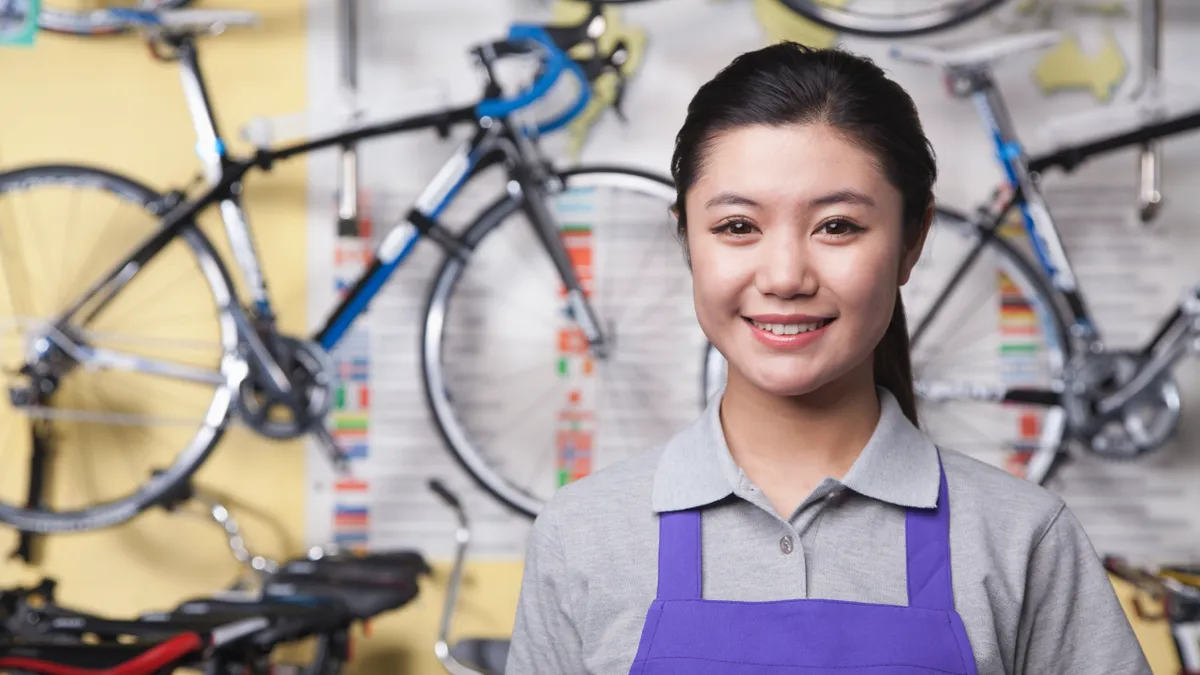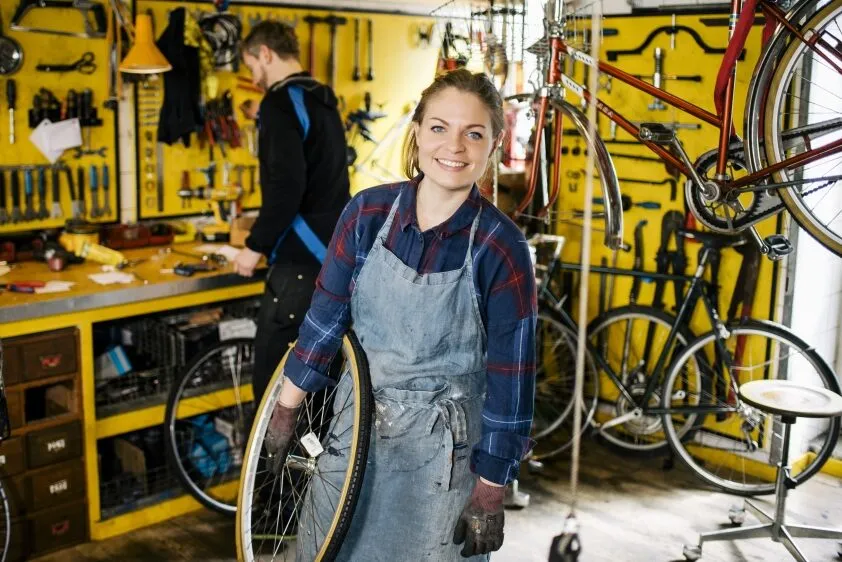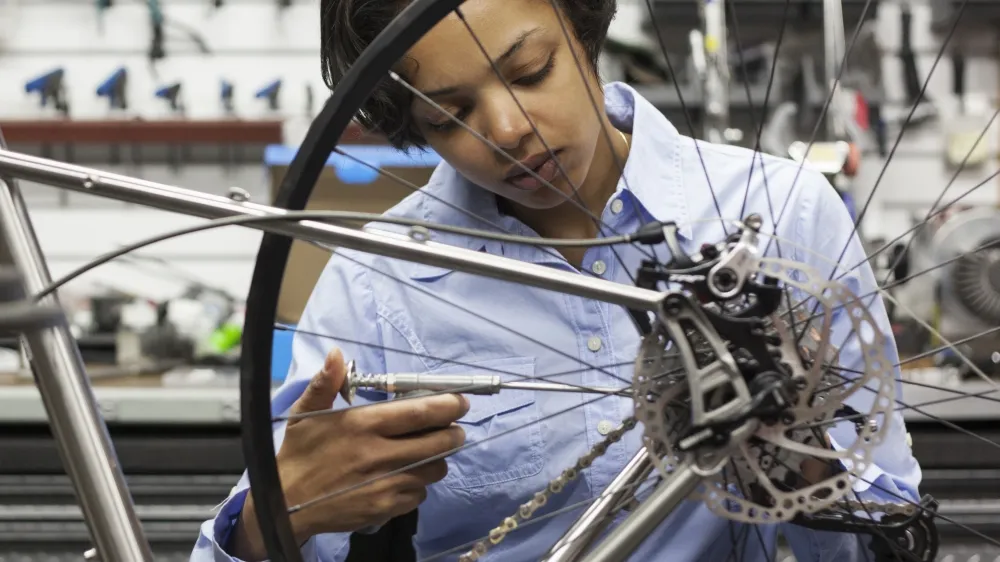With the women probably the fastest growing sector of the cycling market, cycling businesses are scrambling to make their products and services more appealing to this growth market. Many retailers are actively looking for women to join their workforce.
But what is it actually like to work in a bike shop? Do you need to be a hardy type, immune to beards-and-banter? Or are bike shops unfairly branded as boys clubs?
Related: You won't believe the things women in the bike biz get asked
British Cycling reported earlier this year that 254,000 more women are cycling regularly as a result of engagement initiatives like the Breeze programme, and these new converts are likely to keep riding, too. Where women choose to shop and what they opt to buy may be make or break for many businesses.
The League Of American Bicyclists’ report Bike Shops For Everyone found a correlation between shop staff and customer gender: shops with 50 percent or more female customers had more than 40 percent female staff. So it seems that shops that want to attract more women should hire some.
There's evidence to suggest that numbers within the industry itself are growing. Online bike shop Wiggle have seen the number of women working for the company double in the last 5 years, and it now sits at over 30% of their workforce. Within the company, women occupy roles in many different departments from buying, marketing and customer services to operations, events and the international side.
But despite this increase in certain areas, and on the shop and workshop floor, they’re still the minority. What’s stopping more women joining the industry?
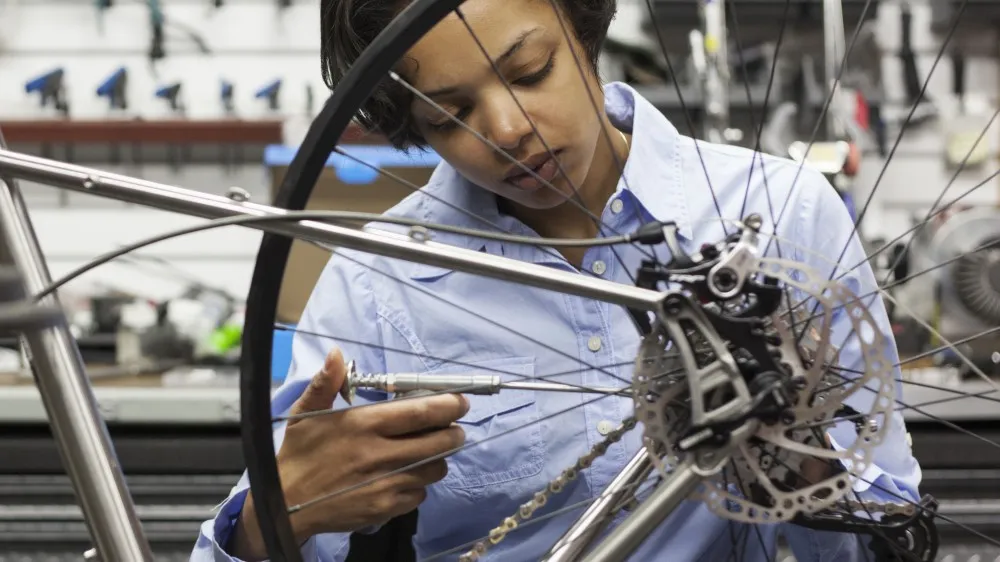
Women aren't just increasing in number on the shop floor. There are growing numbers of female mechanics, designers, engineers and more within the industry
Male dominated atmosphere
There’s no doubt that cycling is still a very male dominated sport and industry, and shops are often perceived as particularly intimidating spaces.
Holly Taylor tells BikeRadar that she found this to be the case when job hunting. Eventually though she found a place she felt happy in – the Edinburgh Bicycle Co-op.
Clare Curtis, who works at Townsend’s Light Blue Cycle Centre, agrees that the bike shop still feels like a men’s area – even in cycle-friendly Cambridge where she is based. Female staff numbers are increasing, she says, but they are still thin on the ground.
Lack of creature comforts
One of the barriers often cited to women using bike shops is the lack of facilities – and this can extend to facilities for the staff. At Belinda Scott’s first bike shop job, everyone got changed in the same room. "If you’re sensitive about half-naked men, don’t event think about it," she tells BikeRadar.
Banter – part and parcel of the job?
Scott, who now works in women’s-specific bike shop Bella Velo in Surbiton, UK, warns that the level of boy banter "may get to" some people.
"You can’t be a sensitive soul and work in a bike shop,” she adds.
But those we spoke to rarely felt that colleagues directed off-colour comments at them personally (though some customers weren’t as considerate, as BikeRadar found out earlier this year.)
Getting up to speed
Bike shop employees are much more than mere shop assistants, and reaching the level of expertise needed can be a challenge initially. ‘I came into it not knowing anything,’ confesses Zoe Forbes, from Giant in Sheffield, who spent her first day pumping up tyres.
A number of the women we spoke to acknowledge that it’s a steep learning curve, but that through experience, they've rapidly got up to speed. The majority now have a knowledge base that's often gratifyingly and helpfully greater than the vast majority of the customers, enabling them to deal with the many and varied enquiries bike shop staff have to deal with.
Many of the women we spoke to complement on-the-job learning with an extensive range of formal qualifications, including Cytech bike mechanic courses and Body Geometry bike fitting.
Do women bring something extra to a bike shop?
What is it about the presence of female staff in a bike shop that encourages more women customers? Self-evidently, it makes the space feel less male-dominated – and there are specific elements women can relate to and advise on.
Collingridge may joke that she’s employed because she can talk to ladies about saddles, but Forbes agrees. “Women want to talk to a woman about shorts,” she says, and has turned her expertise in the technical detail of clothing into her speciality at the Giant store.
Importantly, many of these women are also building communities around the shop – organising rides, women’s maintenance courses, clothing evenings, and health and nutrition talks. The events Georgina Taylor of Brixton Cycles organises are so popular, she often has to turn people away.
Sandra Corcoran, co-owner of Pennine Cycles in Bradford, feel it’s less about what women do and more about all staff having a welcoming attitude. She says non-cycling wives and girlfriends used to wait in the car, but now they’ll come in for a chat too. “If you want women to come into the shop and feel comfortable, you have to be the people they feel comfortable with,” agrees Taylor.
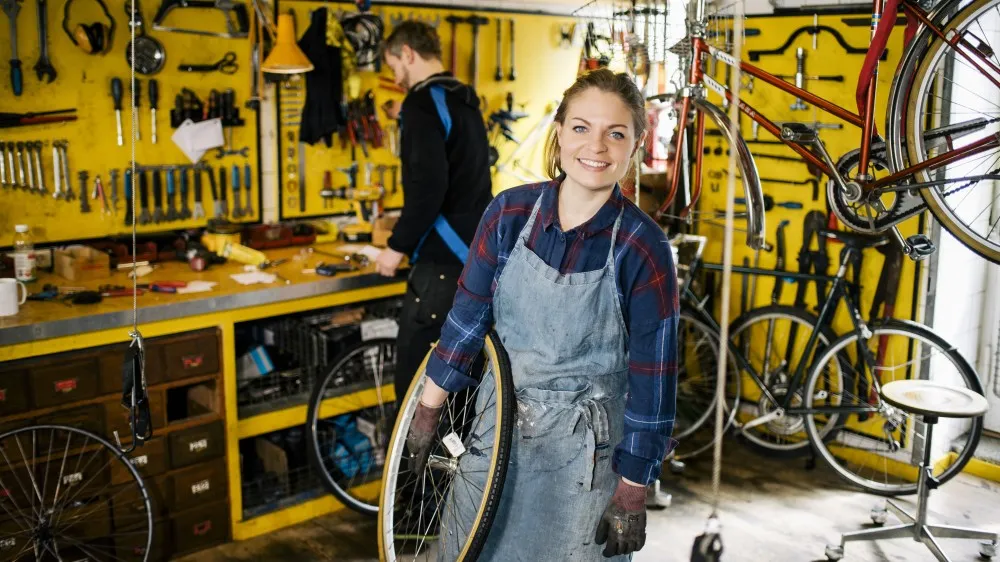
Would you consider turning your passion for bikes into a career?
A career in a bike shop?
So why do so few women seem to be interested in bike shop work? Perhaps they just don’t consider it as an outlet for their skills, suggests Caroline Stewart, from Griff’s Cycle Lab in Crowthorne. “It’s still seen as something women don’t do – I don’t know if I’m just peculiar," agrees Hannah Collingridge.
Others suggest that long hours and lack of flexibility put women off, or that women who race or ride sportives don’t want to work weekends.
Lack of career structure might deter people, but the women we spoke to are finding ways to develop their skill sets – doing social media work, coaching, or wrenching for a cycling team.
Once in the bike industry, there are in fact many opportunities in everything from marketing to engineering, and working in a bike shop is an excellent way to get grounding in the business, make contacts and develop your knowledge and skills.
Times are changing
Things are changing. Stewart says half the students on her Cycle Systems Academy mechanic course were women, and Taylor’s shop colleagues include four other women. She says networking can help counter the feeling of being an outsider. "If you know a cool woman, you can bring her in… we’re not shy about poaching people!" she laughs.
And there are plenty of other benefits. Some cite the fact that it’s such an enthusiastic trade; some like being on first-name terms with customers. It’s a strong enough pull to draw some people away from other careers: one woman we spoke to felt it used the people skills she developed in her previous career as a teacher, and Scott was formerly a lawyer.
It could also be a simple case of time and numbers; as more and more women take up cycling, it’s likely that an increasing number of them will decide to make a move to the other side of the counter. The industry can help this by making it a welcoming environment to work in.
Ultimately, for a lot of women, it’s the opportunity to work in an area they enjoy. “Passion” is the reason, says Collingridge. “You work for money, or you work for something you believe in.”

